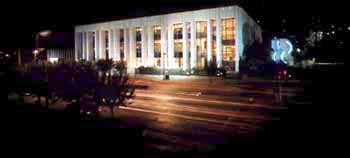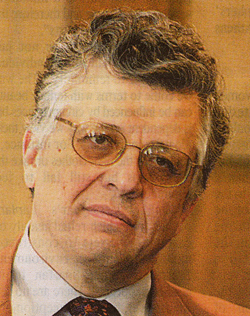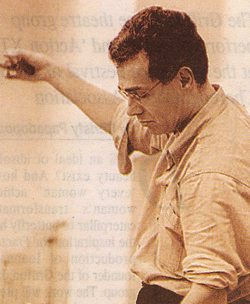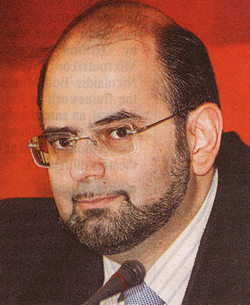 |
||
|
Greek Music Falls on Deaf Ears in Athens?
|
||
|
A festival with Hellenic
focus that proves to be a commendable initiative at the Megaron Mousikis sadly lacked an audience By George Kyrkos-Tayas Athens News |
 |
|
The programme of Cycle I of the Hellenic Music Fest organised by the Athens State Orchestra (May 6-14) augured well: it comprised works by 42 Greek composers spanning three centuries and involved a variety of conductors, soloists and ensembles. It also offered a day dedicated to ancient Greek and Byzantine music plus a three-day musicology conference titled Greek music in the era of globalisation. Granted that Greek classical music features very rarely in concerts here and that it is only recently that our knowledge of Greek musical literature has ceased to be fragmentary, one would expect the significance of the event to have translated into full houses and sold-out concerts. Sadly, that was not the case: in spite of their generally attractive programmes, the four concerts I attended were given in a virtually empty Athens Megaron. Poor marketing and a culture that for three decades now veers towards the popular (as opposed to what is mistakenly perceived as elitist) combined to turn this important, albeit belated artistic initiative into an opportunity missed. |
||
The cycle started with a traversal of music of the Italian-influenced Ionian school by the Athens State Orchestra under Byron Fidetzis. That the overture from Xyndas' opera Conte Juliano opened the evening felt right--the earliest extant opera on a Greek libretto belongs to this composer. A lovely piece, it could have benefited from a more sensitive use of dynamics--a constant weakness of an ensemble that seems incapable of playing below mezzo forte. Still, in Mantzaros' Sono inquietto ed agitato, a Rossini-reminiscent aria where the tone of the music seemed to counter the meaning of the text, they drowned the soloist, baritone Tassis Christoyanno- poulos, only occasionally. His account of Carrer's The beggar was rather unconvincing (the voice sounded too fresh for the Old Man), but the orchestra (especially the cellos) excelled itself with some delicate phrasing. |
 Maestro Byron Fidetzis |
|
| The world premiere of Rhodotheatos' tone poem Athalia offered one of the earliest contributions to Greek instrumental writing; a garrulous but well-constructed piece, it was rendered with clarity and good ensemble. Lavrangas' The bonnie lass is fast asleep and Samaras' Victory celebration were spoiled by soprano Martha Arapi's excessive vibrato--a trait that also marred her diction--but the concert was brought to a close on a high note with a brilliant rendition of Hellenic Suite No. 1, also by Lavrangas. |
||
| The evening on May 10 did not have a theme as such but was equally interesting. Following a short address given by con-ductor Nikos Christodoulou in memory of maestro Odysseus Dimitriadi who died last April, it opened with Koundourov's Sinfonietta, an atmospheric score de-scribed as "a small jewel in Greek orches-tral literature" --the rendition was distin-guished by excellent ensemble, firm tempos and well-executed transitions. Haris Vrondos' Monologue for string orchestra, another world premiere, was played with commitment, the conductor making sense of its veiled poignancy and gentle dissonances. |
 Maestro Nikos Christodoulou |
|
| Yannis Christou's Toccata for piano and orchestra, featuring Geoffrey Douglas Madge as soloist, propelled the small audience right into the centre of this composer's unique sound-world with a rousing, powerful performance that reached high levels of tension and required great agility from the pianist who ended up dripping with sweat. In part II, Skalkottas' Concerto for piano and orchestra No. 1, with the same soloist, was rendered with conviction, internalised precision, rhythmic crispness and--surprisingly in the dramatic Andante cantabile--some humour. With that concert, the Symphony Orchestra of the Municipality of Athens put itself firmly on the map. The second Athens State Orchestra evening (May 12) proved more interesting than the first. Offering works by composers of the so-called National School, it started with Varvoglis' symphonic poem The fete, a joyous piece that betrays French influences but deserves to enter the repertory. Next, Levidis' The return to the enslaved motherland, a tone poem for mezzo and orchestra, was performed by Maria Vlachopoulou, whose well-positioned voice did not hide the rather uniform reading. The two excerpts from Nezeritis' opera King Aniliagos and Axiotis' Reminiscence of a dance were given expressive accounts, but Kalomiris's Romeiki suite did not avoid a degree of bombast in the Scherzo: the Finale compensated for it with some white heat moments in a score that is over-the-top anyway. |
||
|
Of the concert on May 13 it was the performers that mainly impressed me: the Thessaloniki State Symphony Orchestra under Myron Michaelides gave consistently sensitive accounts of works by composers who have been active in Salonica. In Theophanous' Attica, as in Themelis' Icarian dance and Astrinides' Cypriot rhapsody, they both captured the mood of the piece and exhibited all the virtues of solid music-making (especially in the latter). Christos Samaras' Lamento I found pitched a bit strong, but Riades' stage music for Euripides' Hecuba and Margaritis' epic symphony Odysseus and Nausica offered an interesting contrast. |
 Maestro Myron Michaelides |
|
HCS readers can view other excellent articles printed by Athens News in the sections of our extensive, permanent archives at the URL http://www.helleniccomserve.com./contents.html
All articles of Athens News appearing on HCS have been reprinted with permission. |
||
 |
||
|
2000 © Hellenic Communication Service, L.L.C. All Rights Reserved. http://www.HellenicComServe.com |
||
